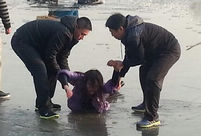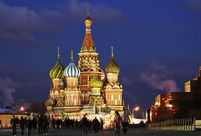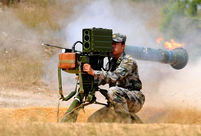 Shocking moments when PLA's weapons open fire
Shocking moments when PLA's weapons open fire Famous Lanzhou beef noodles
Famous Lanzhou beef noodles Armed Police hold anti-terrorism drill in SE China's Xiamen
Armed Police hold anti-terrorism drill in SE China's Xiamen Harbin Int'l Ice and Snow Festival opens
Harbin Int'l Ice and Snow Festival opens 'Jin' named the word of the year by cross-strait netizens
'Jin' named the word of the year by cross-strait netizens Chinese scientific expedition goes to build new Antarctica station
Chinese scientific expedition goes to build new Antarctica station
 Chinese naval escort fleet conducts replenishment in Indian Ocean
Chinese naval escort fleet conducts replenishment in Indian Ocean 17th joint patrol of Mekong River to start
17th joint patrol of Mekong River to start China's moon rover, lander photograph each other
China's moon rover, lander photograph each otherTerrorism
On December 29, 2013, a suicide bomb exploded at a railway station in southern Russia’s Volgograd. The following day, another tram explosion took place in the same city. Both incidents were ascribed to terrorism. In 2014, in a landmark in the ten-year-long battle against terror, NATO forces will finally wave goodbye to Afghanistan. But has terrorism really been defeated yet?
Nuclear issue in Iran
Nuclear talks with Iran reached the stage of an agreement in late November 2013 that Iran would suspend purification of highly enriched uranium in exchange for the end of sanctions by western countries. At the outset of 2014, it is difficult for both sides to achieve political trust in the true sense. Considering the threat of additional sanctions by the U.S., Iran will perhaps develop new nuclear programs bypassing uranium.
China's Territorial Disputes
Maritime disputes between China and its neighbors heated up in 2013. In 2014, against the backdrop of the U.S. ‘rebalancing’ strategy, countries like Japan and the Philippines may attempt to force China to make compromises on their territorial disputes. Any strategic misjudgment could result in exacerbating the situation.
Suicide bombing attack in Iraq
Despite entering the second decade since the end of the Iraq War, for most Iraqis 2013 was year of bloodshed. According to UN statistics, more than 8,800 Iraqis were killed in 2013. Suicide bomb attacks were a regular occurrence in 2013, and will continue into 2014.
A tentative route to Israeli-Palestinian peace
According to the U.S. department of state, U.S. Secretary of State John Kerry plans to visit the Middle East in January this year. He will propose a framework for a Middle East peace agreement outline between Israel and the Palestinians during the visit. It is reported that Kerry was scheduled to visit to Israel and the Palestinian area on New Year's Day. He has expended considerable effort in trying to bring Israel and the Palestinians together, urging the two sides to reach a peace agreement within nine months.
Next nuclear test in DPRK
There is a possibility that the DPRK will conduct further nuclear tests in 2014. If so, the country will certainly face greater and more severe sanctions from the international community. This will also provide an unfavorable setting for the six-party talks.
Balancing game played by Ukraine
Ukraine may sign an association agreement with EU between February and March 2014. The country resumed discussions with the EU on the possibility of an association agreement within the framework of the Eastern Partnership Summit in Vilnius, following the Ukrainian government’s decision to suspend the process of entry into the European Union.
Fourth year of Syria unrest
Unrest in Syria is about to enter its fourth year. In the course of the previous three years, more than 130,000 people have been killed in the violence. A second round of talks will be held in Geneva on January 22, 2014. However, in the context of growing Islamist extremism in Syria, the Geneva conference may find its focus shifting away from how to resolve the Syria crisis and towards the war against terror instead.
Intermittent wars in South Sudan
Two weeks after the outbreak of armed conflict in South Sudan, the situation had already led to 19.4 million people being displaced. Under the mediation of the Intergovernmental Authority on Development (IGAD), the two sides arrived in Ethiopia the day before talks began on January 2.
UN climate change summit
UN Secretary-General Ban Ki-moon will invite world leaders to attend a Climate Summit in 2014. It is worth noting that the 2014 climate summit is not part of the UN climate negotiations. Ban Ki-moon called on countries to make "bold commitments" to promote climate negotiations under the "United Nations Framework Convention on Climate Change.”
 In photos: Ten 'tuhao' devices in 2013
In photos: Ten 'tuhao' devices in 2013 College students saved from an ice hole by brave citizens
College students saved from an ice hole by brave citizens Gallery: Top 10 box office hits in 2013
Gallery: Top 10 box office hits in 2013 Beautiful churches around the world
Beautiful churches around the world Yang Mi, Hawick Lau hold wedding in Bali
Yang Mi, Hawick Lau hold wedding in Bali 'Phubbing' people seen everywhere
'Phubbing' people seen everywhere World's biggest snack shop in China
World's biggest snack shop in China Shocking moments when PLA's weapons open fire
Shocking moments when PLA's weapons open fire World's fastest train CRH380A assembled in E China
World's fastest train CRH380A assembled in E China Successful first 300-meter saturation dive
Successful first 300-meter saturation dive Fire burns down ancient town in Shangri-la
Fire burns down ancient town in Shangri-la Luxurious car adorned with coins
Luxurious car adorned with coins Female Chinese soldiers' 'brutal' training
Female Chinese soldiers' 'brutal' training Undie Run competition held in Nanjing
Undie Run competition held in Nanjing Advanced Chinese weapons that stepped into spotlight in 2013
Advanced Chinese weapons that stepped into spotlight in 2013Day|Week|Month